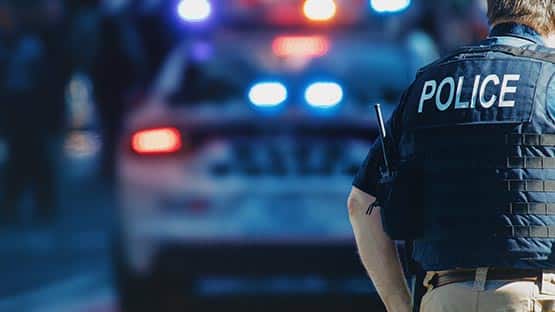
When a mental health crisis happens, law enforcement officers generally respond to the call for help.
U.S. lawmakers passed reform legislation late Wednesday to provide funding to train officers and mental health professionals to work with de-escalation tactics when working with individuals with mental health issues. The legislation is now in the hands of President Joe Biden.
The Law Enforcement De-Escalation Training Act would help police departments across Virginia teach alternatives to use of force, safely responding to crises and making referrals to community-based mental and behavioral health services. The goal of the funding and training is to reduce the number of officer-involved fatalities.
The bipartisan proposal was introduced by Sen. John Cornyn, R-Texas, and Sen. Sheldon Whitehouse, D-Rhode Island in response to national headlines and outcry over the deaths of George Floyd and Michael Brown, to name two of a growing number with similar circumstances.
“By giving law enforcement the tools they need to help those experiencing mental health emergencies and other crises, we can help make communities safer by building a stronger bridge between the criminal justice system and mental health care,” said Cornyn.
U.S. Rep. Abigail Spanberger, D-VA-07, a former federal law enforcement officer, voted in support of the legislation.
“Virginia law enforcement officers are responding to an increasing number of emergencies with members of our communities experiencing mental health crises. These calls can be highly volatile, and officers are not always properly trained on how to de-escalate these situations,” said Spanberger. “We need to make sure that our first responders have all the tools and training they need to keep those in crisis and themselves safe. This bipartisan bill would save lives and help our neighbors who are struggling with mental health issues get the help they need.”
In Virginia, Gov. Glenn Youngkin released a plan this week to create 30+ new mobile crisis units in the state which would respond to calls to the 988 lifeline for people who may be experiencing a mental-health crisis, as part of a larger proposal to address the mental health crisis in the state.
In the Shenandoah Valley, many law enforcement officers already take part in Crisis Intervention Training. It is unclear how this new training will differ from the training law enforcement officers already receive.
Expert: ‘A long way to go’
Family members often call 911 when worried about a loved one – often pleading for the dispatcher to send an ambulance, not police – because of the potential for disaster when their loved one is in crisis. The family member calls out of panic and a need to get their family member safe, but time after time, that call to try to help, makes things worse, with their loved one put in handcuffs and taken to jail instead of a hospital, or worse, their loved one resists, and the encounter turns deadly.
In a 2015 report, the Treatment Advocacy Center found that while nearly one in five adults in the United States have a mental-health condition, those who are untreated, are 16 times more likely to be killed during a police encounter than other people encountered by law enforcement.
The author of the report isn’t sure the additional training will solve the issue.
“You can provide as much training and de-escalation funds for the programs as you want, but it doesn’t necessarily solve a lot of the problems associated with risk of death for people with severe mental illness at the hands of law enforcement,” said Elizabeth Sinclair Hancq, the director of research for the Treatment Advocacy Center and author of the 2015 report, in an Associated Press report.
The role of law enforcement is to enforce public safety, she told the AP, not to be mental health crisis providers.
“I do think that this is a step in the right direction, but until we prevent some of these kinds of encounters between people with mental illness and police from happening in the first place, we have a long way to go,” said Hancq.
Breaking down the legislation
The Law Enforcement De-Escalation Training Act would:
- Require the Community Oriented Policing Services office at the U.S. Department of Justice to develop training for law enforcement and mental health professionals on effective de-escalation tactics, alternatives to the use of force, safely responding to an individual experiencing a mental or behavioral health crisis and making referrals to appropriate programs and services.
- Authorize $40 million in Fiscal Year 2025 and $50 million in Fiscal Year 2026 in for training, including scenario-based exercises and evaluative assessments.
- Require the National Institute of Justice and the Government Accountability Office to evaluate the implementation of the program and the effect of the training to ensure that the curricula have a tangible impact on law enforcement encounters with people in crisis and identify possible changes that would further improve outcomes.
The bill is endorsed by the Fraternal Order of Police, Major County Sheriffs of America, Major Cities Chiefs Association, National Criminal Justice Association, National Association of Police Organizations, National Sheriffs’ Association, National Association of Counties, American Psychological Association, National Alliance on Mental Illness, American Counseling Association, National Register of Health Service Psychologists, American Association of Suicidology, College of Psychiatric and Neurologic Pharmacists, American Association on Health and Disability, Lakeshore Foundation, Anxiety and Depression Association of America, American Association for Psychoanalysis in Clinical Social Work, Maternal Mental Health Leadership Alliance, National Association of Pediatric Nurse Practitioners, National Association of County Behavioral Health and Developmental Disability Directors, National Association for Rural Mental Health, National Federation of Families, American Foundation for Suicide Prevention, the Network of Jewish Human Service Agencies and the Niskanen Center.
Related story
Governor’s plan: $230 million for behavioral health, funding for 30 mobile crisis teams










